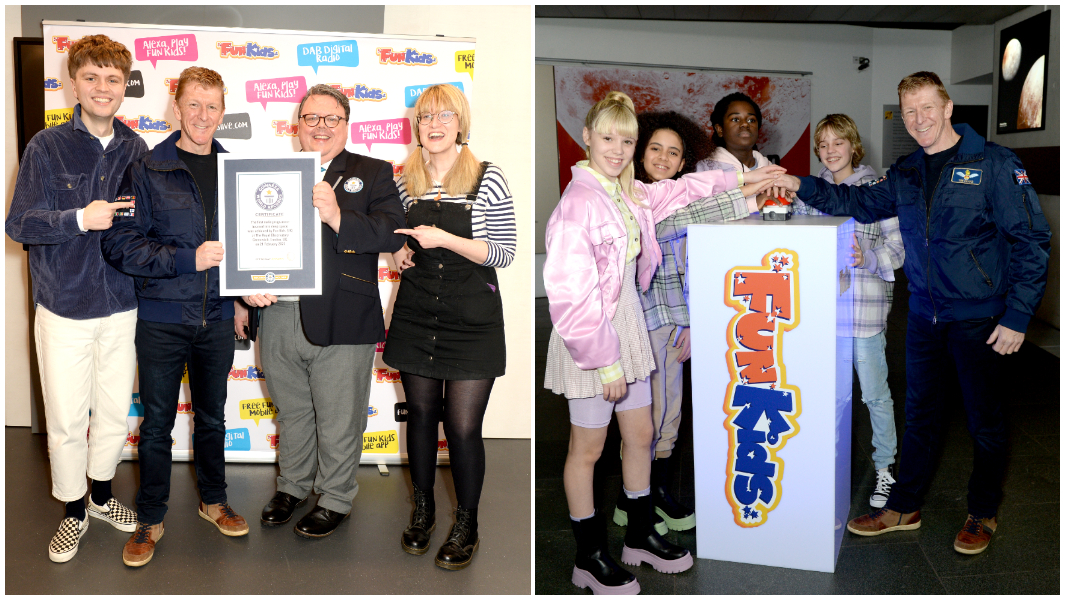Radio programme beamed into space for first time breaking record

British radio station Fun Kids has broken the record for the first radio programme beamed into deep space.
The programme, named "Mission Transmission", was sent into space in an attempt to establish contact with an alien civilization.
The radio programme, which features kids from all over the UK, mixed in with messages from around the world and pop music, took place thanks to a unified effort from the UK and Texas, US.
The broadcast was sent as a radio signal with a light wave that takes 1.3 seconds to pass the moon and travels at the speed of light (299,792,458 metres per second).

The radio message, which will stay audible for millions of years, will take:
- 4.2 years to reach our next nearest star, Proxima Centauri, excluding the Sun
- 2.5 million years to reach the next galaxy
"Fun Kids is known for being available across the UK but now we can say 'across the universe!'" – Adam Stoner, Fun Kids producer

The Royal Observatory Greenwich, home to Greenwich Mean Time (GMT), was the location of this epic record.
Free from any form of light pollution, a thousand stars shone brightly over the observatory on the evening of the attempt, which took place right on the Prime Meridian line.
"The Royal Observatory Greenwich is incredibly excited to be partnering with Fun Kids to send the broadcast out into space," declared Emily Drabek-Maunder, an astronomer at the Royal Observatory Greenwich.
"Maybe someone many years from now will pick up our broadcast out in space and listen to our message all the way from another solar system!"

But Fun Kids, Guinness World Records editor-in-chief Craig Glenday and the record-breaking astronaut Tim Peake (UK) made sure to check all the boxes of 'epic alien contact': red button, a dramatic countdown and a crowd of space-loving children.
Fun Kids received more than 2,500 submissions and included as many voices as possible into the message that was broadcast worldwide and galaxy-wide on Monday evening.

"We're so delighted to be able to send hundreds of children's voices into space and to make history with our radio programme. Setting a 'first' record is really quite special. It feels amazing to know that, in the same way the voices of our listeners will travel forever through the universe, we'll forever hold that 'first'!" – Adam Stoner
"One of the biggest challenges when putting this radio programme together was deciding what should go in it," added Fun Kids' producer Adam Stoner, one of the minds behind the "Mission Transmission" project.
"Everyone who submitted something to us gets their name sent to space but only the very best got a seat aboard the radio rocket."

The red button to launch the message was pressed by a crowd of space-loving children and record-breaking astronaut Tim Peake, the first British astronaut to visit the international space station, propelling the radio programme into outer space.
"Just statistically, when you look at the sky, there have to be other forms of life out there. There must be civilizations." said the record-breaking astronaut.
"When you think about aliens it seems very childish, doesn't it? But it's not. We are talking about one of the most fundamental questions in the world: is there life out there in the universe? And it's great to get young people thinking of that." - Tim Peake
Tim Peake (UK) also holds the record for the fastest time to complete a marathon in orbit - with a time of 3 hours, 35 minutes and 21 seconds running on a treadmill.

"This is our people, our voice, our music," says the message, holding out an invisible hand across the universe.
There is no theoretical limit to the distance the signal can travel, thanks to radio transmitters that penetrate Earth's atmosphere. The message will stay audible for millions of years for any being that may come across it.
Maybe, in many, many years, a civilization will pick up the message and possibly respond.

But Guinness World Records’ Editor-in-chief Craig Glenday wasn’t only on-site to witness the launch and adjudicate the record.
The launch of the first programme beamed into deep space reminds us that our world spills into a vast, unknown universe.
That is why Guinness World Records is ready to launch itself into a galaxy of wonderful records with Guinness World Records 2023.

Craig Glenday presented the newest edition of the best-selling book from the dome in the Royal Observatory Greenwich.
The cover is once again designed and brought to life by Rod Hunt’s artistry, following his designs for the 2021 and 2020 editions.
Together, the three covers form a unique and record-breaking world that is as vast as the curiosity, creativity and fun encouraged by every edition of Guinness World Records.


